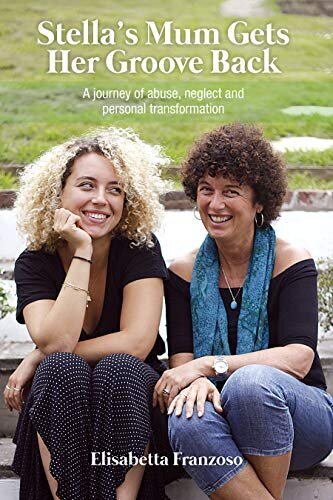When I first chose to get help from a counsellor, I was 37. After seeing myself repeat learnt negative patterns and behaviours as a mother and wife, I chose to go beyond the shame and taboo of sharing my inner world and my history with a stranger. My intuition told me that this decision would set me on a new path of awareness and help me find freedom. Soon after, I did.
Many years before that, at 20, I had decided to go to see a psychiatrist to ask why I experienced sudden bursts of rage. I thought I was going crazy. I left being told that I was totally ok; according to my doctor, all I needed to do was leave home and get some distance from my family to be able to nurture my mental and emotional health alone.
When the time came, I helped my daughter consider counselling or coaching to process the pain and stuck emotional energy and baggage that we store within ourselves after traumatic or painful episodes which we all might be subjected to over our lifetimes.
For my mum it had been different. She was 40 when she was recommended to see a psychologist for a long depression, but she always refused to receive help. In her 70’s, a cardiologist had offered the same advice but to no avail. The intent had been to find a way to lower her blood pressure that was spiking due to recurring anxiety and panic attacks, but her response would always be, “I will never speak to a stranger about my private affairs”.
I have several friends who chose to do the same as my mum and I’ve found there’s a general resistance and reticence to opening up to a counsellor or coach, although this is slowly diminishing thanks to modern wellness and self-care trends.
Do you approach therapy easily? Do you ask an expert for help when you feel mentally or emotionally strained, the way that you would with a doctor for a physical ailment? Do you go to consult a coach when in need of motivation or find yourself losing balance, confidence or a sense of purpose? Do you consider the possibility of reaching out to a counsellor or coach for help and as a way to achieve greater self-awareness and confidence or is it shrugged off as a luxury service, something that you don’t need or a taboo? I challenge you to dig deep with your answers to those questions, asking why and becoming inquisitive regarding your answers.
It has been proven that self-enquiry and personal development is liberating and empowering. Social media is overpopulated with quotes, podcasts, courses and webinars on becoming a better version of ourselves, so why do the majority of us still refuse to consider therapy, counselling or coaching as an effective solution?
There may be several reasons, none of which is more valid than the other. All of our choices, or not-choices, are in fact driven by a motive.
Common Reasons We Choose Not to See Counsellors or Coaches
I thought it would be interesting and revealing to share some of the most common reasons why people choose not to approach counsellors or coaches that I’ve come across:
- It is a considerable financial commitment or investment, which not everyone can afford or prioritise
- It requires an admission of needing help and many people believe (or want to believe) that they don’t need help. Some people will see others much worse off and minimise their own suffering because they don’t think it’s as valid as someone else’s suffering.
- Some might believe that their issues can’t be helped or solved by someone on the outside, especially not by a total stranger.
- There’s a social judgement / taboo that going to therapy means there is something wrong with us or that we are mentally unstable. Even with the growing conversation and awareness, there is huge stigma around mental health.
- Toxic shame and guilt.
These all seem like straightforward reasons, so why bother writing an article? Because in truth I believe these reasons only scratch the surface and don’t address or reveal the full underlying truth.
The Truth About the Reasons We Refuse to See Counsellors / Coaches
Sooner or later, I believe we all need to talk to someone and truly be heard. Many resistances, including those listed above can come up for us, like money, time, energy, arrogance, ignorance, apathy. What’s difficult is admitting that these are in fact defence mechanisms cropping up that help us avoid ‘going there’. Seeing and speaking to someone means recognising, acknowledging and god forbid, feeling the many hurts and scars we carry within ourselves. Facing these ‘inner demons’ requires enough courage to overcome not just social judgements, but even more powerful, our personal resistances and defence mechanisms which were put in place to protect us when we most needed it but have not since been put aside.
This being said, we cannot enforce others to embark on a journey if it doesn’t feel right for them. Each choice we make for ourselves is ok and when the time is right, all will become clear.
The long-term experience I’ve had in this field, as a coach, counsellor, assistant and facilitator in many different settings and groups, have helped me see that all the above ‘excuses’ or resistances are really just protecting us from one thing, pain.
Wounds of the past that feel distant over time. Hurts that never really healed because they were disregarded and denied. Sorrow and grief that was never processed through crying. Traumas that were never fleshed out and all the emotions that come with all of it, anger, hate, resentment, bitterness, coldness and of course fear.
I believe that the real reason why we refuse to engage with therapy or coaching, asking for external help, is because deep down we feel there is unresolved pain. It’s all relative, if you’ve seen someone else endure more suffering than you, this does not diminish yours. Pain is the reason why our hearts close a little bit more each day without us even realising it. Nobody makes the effort to educate us because it’s a no-go, our society only wants pleasure.

We are not told that when we ignore and deny our pain, its layers grow and roots deepen over time until we become cold, distant, indifferent, arrogant and/or disconnected. But these are all ways we have become professionals at pretending that our pain is not there. We become stone trying to fight for the pain to stay inside, controlled, behaved. We have developed an effective armour on which we have become dependent. We don’t feel its heaviness, because anything is better than feeling what it’s protecting us from; a necessary pain to protect us from the real deal. It is saving us from having to feel our own vulnerability and recognise the fragility and many hurts of our heart.
Going to see a therapist or coach, or going to a self-development retreat, means actually confronting what we as a society think we’ve been running away from, but have actually become most attached to: pain.
We go on avoiding it and in so doing, keep recreating it in our lives. Carl Jung hit the nail on the head when he said, “the more we resist something, the more it persists”.
A Society That Runs from Pain, Creates Pain
It’s a strange paradox because the more pain we hold onto, the safer and stronger we feel, the less need for a therapist or coach. Our ability to protect and resist gives us the false impression of confidence and empowerment, which in turn makes us believe we don’t need help or guidance from anyone else, because we’re fine!
So here we are, building a weird and inauthentic society for our children, on the foundations of unresolved pain. A society running from pain that seems confused when more pain is generated. With every layer of pain that goes unprocessed inside, we feel less, sense less, recognised less, open up less, close our hearts more. Until as a society, we become indifferent, self-serving and narcissistic, totally blinded to what’s unfolding by the belief that we are strong, and we are fine!
In truth, if we can’t reach out for ourselves, we should do it for our communities, and those we love. Because when we refuse to acknowledge our pain and we escape from it, we do the same with others’ pain. When we remain insensitive or indifferent to our pain, we begin to act the same with others’ pain, including our children. It becomes a spreading contagion.
When we refuse to understand our pain and choose not to process it, how can we hope to understand and feel others’ pain? How can we develop empathy for others’ pain when we cannot even feel compassion for our own because we pretend it’s not there? Being empathic requires us to become emotionally intelligent and emotional intelligence requires us to find the courage to turn our gaze towards our pain, without letting it take control of us.

Identifying Pain
Excerpts from ‘Stella’s Mum Gets Her Groove Back: a True Story’ (p. 156 – 164)
“In order to identify and confront the beast, it is important to comprehend and acknowledge that there are different kinds of pain. Through my personal experience, I have learned to identify and refer to them as: existential, neurotic and transformational pain.
Existential: I believe existential pain affects us all and is unavoidable; it is part of the process of life… Existential pain is the pain of giving birth, the pain of grieving for the death of a relative or a close friend.. the pain of growing older. Existential pain is a fact of life.
Neurotic Pain: We can’t avoid existential pain; it is a part of life. Neurotic pain is a different story. It is something that we create and re-enact ourselves, driven by our conscious and unconscious addictive behaviours, beliefs, compulsive assumptions and emotional reactions. Let’s think about the nature of our pain for a moment. Is it a pattern in our lives? Is it causing the same old feeling of discomfort over and over again? If it is a pain we feel constantly and we have learned how to live with it, then it is certainly what we can define as neurotic pain. It is not the pain that’s part of life: it is an optional suffering that we compulsively perpetuate.
Transformational Pain: The pain that comes with making changes, developing and transforming emotionally, intellectually and spiritually. Unlike existential pain, which is inevitable, transformational pain is a choice. I identify it with the physical pain we may feel when we exercise. We choose to endure the painful demands of working out in order to reach new levels of fitness and well-being.”
Pain is part of the condition of being human and is a tool through which we can grow mentally, emotionally, and spiritually. When we avoid our suffering instead of dealing with it, we risk it being truly damaging or worthless. However, when we face it with courage and look behind the mask of the beast, our pain, recognising the truth that lies there, we can find the inner drive to create something positive out of something negative. With passion, focus, discipline and commitment, we can eventually transform and empower ourselves from the inside, out.
Q & A – Why Do You Think People Avoid Seeing a Counsellor or Coach?
I asked a few clients and friends why they think people avoid seeing a counsellor and would love to share their answers with you:
- Why do you think people tend to avoid going to see a counsellor or a coach?
“Therapy or any work on ourselves can be a scary process: you need to face pain, you need to discover in you someone you never met before and it can be hard to recognize yourself in that new ‘you’. Furthermore, you need to face the stigma around therapy, which is the same stigma around mental health: I need to admit something is wrong with me. And finally, there is an issue of laziness too and finding it hard to fit the work you need to do with a counsellor or a coach with your already busy routine.“
Cristina Casagrande – Executive – Italy
- “A.1. In many societies there is a stigma attached to seeing a counsellor. This is certainly the case in the East and was the case with me when I was brought up in England where it was considered weak to seek help or guidance from a trained professional. I think the US is an exception to the rule where it is not so frowned upon to see a therapist personally or a coach for professional guidance.
A.2. Denial. I convinced myself that whilst I wasn’t perfect it was OK to carry on behaving a certain way as others I knew were worse than me. Only when I hit rock bottom did I realise I needed to take action, even though I had no idea what that looked like at the time!”
Tommy B. – Enterpreneur – UK
How to Turn the Tide & Inspire Others to Ask for Help
So, what can we do to change this destructive trend within ourselves and our society?
It’s no more complicated than simply educating ourselves. Learning and understanding. Becoming responsible and searching for our awakening. Walking our talk and putting our new understanding into practice. Spreading the message of the deep necessity for self-awareness by showing others the results we have had in our lives by looking within.
header image by Nikko Macaspac

My book Stella’s Mum Gets Her Groove Back is now available on Amazon Kindle.
Click here to get a copy.
The following blog posts go into more detail on some of the topics and themes touched on above:
How to Overcome Your Fear of Rejection
What Is A Confidence Coach & Do I Need One?
The Connection Between Unconditional Love & Self-Confidence
How a Vision Board Can Boost Your Confidence in 2019

